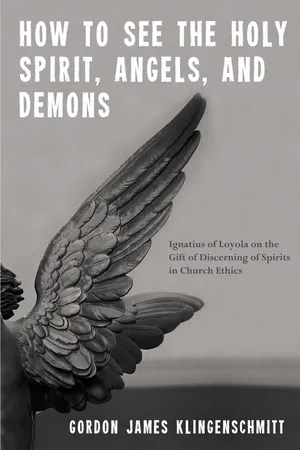![]()
1
Pre-Ignatian Influences Upon Ignatius of Loyola’s Discerning of Spirits
This study attempts to make connections between the field of ecclesial ethics and the spiritual gift of discerning of spirits by arguing that the two are interdependent and foundational to each other, as correlated through the theology of Ignatius of Loyola. Specifically, Ignatius’ Rules for Discerning of Spirits presents a clear locus for comparison in which ethics and discernment are mutually interdependent concepts. By incorporating the Ignatian tradition of discernment into the contemporary field of ecclesial ethics, I shall argue that non-human spirits influence, inspire, and manifest themselves within human morality; therefore, those spirits should be seen and tested before the church can discern right from wrong and make ethical judgments. Conversely, proper discernment in the field of ecclesial ethics should help us to discern and reveal the non-human spirits working behind those human ethical impulses, whether good or evil. In order to clearly understand Ignatius’ view of these topics, however, his antecedents must be identified and analyzed. Only by examining (in this chapter) those who influenced his conception of discerning of spirits can we fully examine (in chapter 2) how Ignatius learned of, and formulated his understanding of the gift in ethical context. This chapter shall therefore introduce and analyze the contributions of four theologians who provoked Ignatius toward deep thought concerning the gift of spiritual discernment.
Ignatius of Loyola testifies of being personally converted to faith in Jesus Christ on his sick bed while recovering from a war injury after reading the Gospels with two supplemental books by Jacobus de Voragine and Ludolph of Saxony. Ignatius told his biographer that he credited these same two books for helping him receive or discover the gift of discerning of spirits:
Hence, for Ignatius, the opening of his spiritual eyes, with the new ability to recognize the difference between good and evil spirits, which are otherwise invisible to those without the gift, begins by self-examination of the internal movements of one’s own soul. Ignatius would later describe these movements in terms of consolation (grace from angelic spirits or the Holy Spirit) and desolation (temptation from demonic or evil spirits). Ignatius would soon contend that by discerning internal ethical movements, one can discern the non-human spirits influencing human moral thoughts.
Besides Ludolph and Jacobus, Ignatius personally recommended that his students attend Spiritual Exercises retreats that they should spend hours daily in prayerful meditation and that “it greatly helps to read occasionally out of [Thomas à Kempis, 1418] Imitation of Christ or the Gospels, or [Jacobus’] Lives of the Saints.” Besides these three sources, a fourth source has been shown to influence Ignatius—namely, John Cassian’s The Conferences, with its monastic rules, ascetic themes, and discerning of spirits—which helped to inform not only the Ignatian Jesuit Order but also their predecessors in the Benedictine, Franciscan, and Dominican monasteries. This four-fold influence of Cassian, Jacobus, Ludolph, and à Kempis therefore provides a significant spiritual foundation for Ignatius, in both his discerning of spirits and ecclesial ethics.
1.1 John Cassian
John Cassian (c.360–430 AD) was likely born in present-day Romania, trained in the classics and lived on a large family property, until leaving in his twenties or thirties with a slightly older friend, Germanus, to join a monastery in Bethlehem. He visited Egypt twice, learning from the ascetics there for ten years, reading the works of Origen at the hand of his primary teacher Evagrius Ponticus and later traveled to Constantinople where he was ordained a deacon by John Chrysostom. Upon traveling to Rome, Cassian was ordained a priest, and founded two monasteries in Marseilles, where he wrote three books, including The Conferences, which informed later thinkers such as Gregory the Great and Thomas Aquinas, “who cites him more than a dozen times in the section on moral theology of his Summa Theologiae. [Cassian was] one of the great, albeit less well known, preceptors of the West.”
Although Ignatius of Loyola does not cite John Cassian among the early works as causing his conversion, the influence of Cassian, Evagrius, and Origen upon Ignatius’ Rules for Discerning of Spirits is well documented by Heinrich Bacht. Concerning the spiritual gift of discerning of spirits, “According to Cassian it is the ‘mother, protector, and guide of all virtues.’ Consequently, if Ignatius puts such emphasis in the Exercises on the use of this gift of discernment, then it only shows how dependent he was on the early monastic tradition.”
Common to both Ignatius and Cassian is “the emphasis with which they insist on the continual exercise of this [spiritual] discernment.” And, the suggested method of receiving the gift is also common to both Cassian and Ignatius: submission to a spiritual director.
Both Cassian and Ignatius believed and taught the gift of discerning of spirits should best be caught, not merely taught, from one who already had the gift. Ignatius’ Rules are rooted in the monastic tradition of John Cassian’s Conferences, of which the following select quotes represent Cassian’s understanding of discerning of spirits, and its connection to ecclesial ethics.
The Conferences
John Cassian connects human ethical vices with the kingdom of the Devil and human ethical virtues with the kingdom of God early in his explanation of discernment. For example, he writes in his First Conference, On the Goal of the Monk,
Here can be seen the beginning point of understanding Cassian’s ethics by his intent to connect them to their spiritual sources. Entry to the spiritual kingdom of the devil comes by practice of ethical vices, and to the kingdom of God by purity and ethical virtues. While this seems basic, it becomes more complex when understood in the fuller context of the gift of discerning of spirits.
